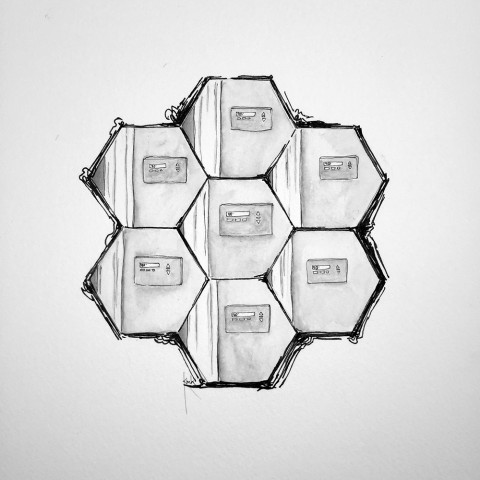
The following review is part of SmokeLong’s 20th-anniversary series looking back at beloved narratives in our archive. If you write reviews and you want to celebrate a particular narrative from the past 20 years of SmokeLong, dive into our archive and send us a review through Submittable. We pay a small honorarium for accepted pieces.
_________________________
by Christopher Notarnicola
The first sentence is crucial. An impactful opening usually qualifies as a welcome element in any literary form, but a punchy beginning is particularly important in a work of flash fiction due to the economy of language, limited space for background information and character motivation, and—let’s face it—a relatively impatient readership that tends to be unforgiving of slow starts. None of that is a problem for Andrew Gretes, whose story “One Degree of Safety” from Issue Fifty-Three opens with “I call my brother because of the wasp in the kitchen,” and right away we can see the situation, the inherent drama, and the structure over which this drama will play out. From this simple and highly informative foundation, Gretes builds a subtly poignant and deeply layered story about familial vulnerability, existential anxiety, and the oblique ways we come together to confront the aggressors in our lives.
A man calls his brother, an entomologist, for his advice on how to eliminate a wasp in the kitchen, but their conversation never tends toward a practical solution, and the closest the brothers come to a resolution is to wait two days for the wasp to starve. Neither seems bothered by the impracticality of this plan, and their conversation moves on, so the reader is left to wonder about the necessity of the call in the first place. In my favorite moment—one I’ve returned to many times in my mind—the narrator admits to calling his brother over his wife because his wife would be likely to remind him that he’s thirty-four years old, and he continues, “That’s one of the differences between marriage and brotherhood. When you’re married, you age.” This aphoristic phrase not only resonated with me personally, because siblings can’t help but be kids with each other, but it also clued me in that this phone call was about more than the wasp in the kitchen. When we later learn that their father has prostate cancer, it becomes clear that the call was an excuse to connect, to come into contact the way Japanese honeybees band together to support one another in times of crisis. This melding of the literal and the emotional stakes, the physical and the metaphorical, the story and the theme, is what elevates this flash piece from a situational comedy to a heartfelt and acutely rendered drama.
Gretes is similarly deft at handling dialogue, which is a tricky craft element in general and is especially easy to flub in flash fiction. If characters say too little in the name of concision, they can come across as blanketly terse or glib. If they say too much, the writing can seem unfocused, ill considered, or wasteful. One of the tricks at play in “One Degree of Safety” is the clever combination of direct and indirect dialogue:
I ask about global warming—if there’s a scenario where humanity doesn’t turn Earth into Venus.
He says, “Pete, the sun is a naturally occurring nuclear reactor. If we can learn to harness its power, everything should work out.”
I repeat the word “if” the way Sam Waterston says “objection” on Law and Order.
My brother repeats: “When, when, when…”
The conversation goes from there.
The entire plot is comprised of a phone call, so this piece could have easily fallen into the trap of an extended dialogue exchange like a mind-numbing shot-reverse-shot sequence from a T.V. show, but it varies the rhythm by incorporating moments of indirect dialogue, relaying some aspects of the conversation solely through narration. For me, this creates a somewhat comforting sense of narrative control amid what might otherwise have been a stream of unorthodox responses. It slows the pace and allows the reader some processing time.
This mixing of the direct and indirect is also mirrored in the content of the brothers’ conversation and proves revealing of both the dynamic of their relationship and the formal decisions of the writer. In their opening conversation, the protagonist’s brother’s response is both direct and indirect, addressing an understandable fear of the wasp and acknowledging its validity but also indirectly encouraging triviality and entertaining a comparison of the wasp to the monstrous queen from the film “Aliens.” Later, when the actual topic of their shared anxiety is finally broached, they approach it obliquely. “I ask him about our father’s health. He emphasizes the low mortality rate of prostate cancer.” The characters want to but cannot openly speak about their subject directly, and the writing brings that sensibility to the reader by oscillating between direct and indirect dialogue.
Distance is an admirable feat. Writing is so often lauded for its ability to bring the reader in close, to put one in the mind of a character, to collapse the boundaries of the self more readily than any other artform, and I have known those praises to be true, but I’m always more impressed when I read a narrative that keeps me at arm’s length, perhaps because it must, and I walk away from that story with a sense of closeness to the characters not despite but because of that distance. Flash fiction is positioned to embrace the aesthetic of the remove, the askew, the out of reach because it has already eschewed so much in the name of brevity. “One Degree of Safety” by Andrew Gretes exemplifies the form through its use of dialogue and allusion to illustrate its characters’ interiority, engage the reader, and create an immersive story about the complexities of familial relationships and existence at large. From an insect on the ceiling to the unfathomable power of the sun in about five-hundred words—this piece makes me wonder if there’s anything flash fiction can’t do.
________________________
 Christopher Notarnicola’s work has appeared in AGNI, American Short Fiction, Bellevue Literary Review, Best American Essays, Best Microfiction, Chicago Quarterly Review, Image, River Teeth, The Southampton Review and other publications. Find him in Fort Lauderdale, Florida and at christophernotarnicola.com.
Christopher Notarnicola’s work has appeared in AGNI, American Short Fiction, Bellevue Literary Review, Best American Essays, Best Microfiction, Chicago Quarterly Review, Image, River Teeth, The Southampton Review and other publications. Find him in Fort Lauderdale, Florida and at christophernotarnicola.com.
Read “Field Protective Mask” by Christopher Notarnicola in Issue 54 of SmokeLong Quarterly.
